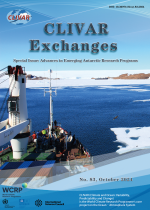CLIVAR Repository for Evaluating Ocean Simulations
REOS Introduction
This web page aims to organize methods for evaluating ocean simulations by bringing together datasets, analyses/syntheses, tools, papers, and commentary. We solicit input from the modelling, observational, and analysis communities to provide guidance and oversight for the contents of this page.
REOS aims to facilitate the research community's access to
- basic datasets and analyses/syntheses products
- metrics for evaluating variability and processes inlcuding input by ocean basin proposed by the CLIVAR basin panels
- guidance on ocean model validation
- tools available for the community for ocean model data analysis
- a comprehensive bibliography of papers, linked to the online articles where possible.
The REOS website is still 'work in progress'. As this page matures through usage and input, navigating the content of this web page will improve. Please send any comments and suggestions, as well as input, to Lei Han.
News
Website on ENSO Metrics for coupled models. See also the REOS webpage on Metrics recommendations from the CLIVAR Pacific Implementation Panel.
 |
|
Figure Caption: Eddy Kinetic Energy (EKE, in cm^2/s^2) of the surface geostrophic flow for the high-resolution NOAA/GFDL climate model CM 2.4 (left) and altimetric observational datasets (right). Note the logarithmic scale (courtesy of the Climate Group, GFDL).
Useful Links
Ocean Observations Panel for Climate (OOPC)
OOPC has developed a tool experimentally of ocean climate indices that can be linked to major patterns of climate variability with significant social impact, and estimations of their uncertainty, which give an indication of our ability to measure the ocean. They also provide an at-a-glance overview of the state of the ocean climate, and a way to talk to a wider audience about the ocean observing system. These indices have been calculated using observational analyses sourced from different operational centers, and are updated on a weekly or monthly basis.
Joint WMO-IOC Technical Commission for Oceanograpgy and Marine Meteorology (JCOMM)














